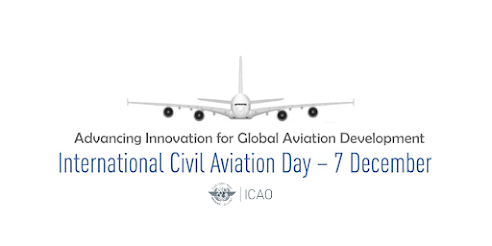- From 3 to 7 December 2023 in Riyadh, Saudi Arabia, The ICAO Air Services Negotiation Event (ICAN2023) will discuss current industry trends and issues, and exchange experiences, in addition to the negotiation of agreements; The event is hosted by the General Authority of Civil Aviation of the Kingdom of Saudi Arabia.
- From 5 to 7 December 2023, Montréal, CANADA will be held the DRONE ENABLE 2023 symposium entitled ''Innovation and infrastructure developments supporting the future of unmanned aviation.' Register to participate Drone enable 2023 symposium.
- From 6 to 8 December 2023 in Almaty, KAZAKHSTAN will be held the ICAO TRIP Regional Symposium entitled ''Building future Resilience:The role of seamsless and contactless travel.'' Registration are closed.
- From 12 to 14 March 2024 in Montréal , CANADA will be held the 2024 ICAO Innovation Fair entitled “Digital Aviation: the Future is Now.”. Register to participate to the ICAO Innovation fair 2024.
- From 30 April – 2 May 2024 at the Barceló Bávaro Convention Center, will held the ICAO Global Implementation Support Symposium 2024, you can view the draft ICAO/GISS 2024 Symposium Detailed programme, and Register to Participate to the ICAO Implementation support Symposium.
- From 9- 12 September 2024 at ICAO HQ, Montréal, Canada will be held the First Advanced Air Mobility Symposium (AAM 2024) entitled “Advanced air mobility (AAM) global harmonization and interoperability: Challenges and opportunities?“.Register to participate to the 1st ICAO Advanced Air mobility Symposium.
WEBCASTS: Aviation professionals keeping our industry safe and secure are our greatest asset. Stream the latest videos from ICAO and civil aviation partners.Watch events, expert webinars, training content and much more on thematic of the International Civil Aviation Day 2023 is “Advancing Innovation for Global Aviation Development.” on ICAO TV.
WEBCASTS: Aviation professionals keeping our industry safe and secure are our greatest asset. Stream the latest videos from ICAO and civil aviation partners.Watch events, expert webinars, training content and much more on thematic of the International Civil Aviation Day 2023 is “Advancing Innovation for Global Aviation Development.” on ICAO TV.
The ICAO Assembly adopted a long-term global aspirational goal (LTAG) for international aviation of net-zero carbon emissions by 2050, in support of the UNFCCC Paris Agreement‘s temperature goal. This is a historic agreement that reinforces the leadership of ICAO on issues relating to international aviation and climate change. Read the adopted Resolution A41-21.
HISTORY OF THE DAY
The International Civil Aviation Organization (ICAO) is a specialized agency of the United Nations and was created with the signing in Chicago, on 7 December 1944, of the Convention on International Civil Aviation. ICAO is the permanent body charged with the administration of the principles laid out in the Convention. It sets the standards for aviation safety, security, efficiency and regularity, as well as for aviation environmental protection. ICAO’s membership comprises 193 Member States. Its headquarters are in Montréal and it has regional offices in Bangkok, Cairo, Dakar, Lima, Mexico City, Nairobi and Paris. The aims and objectives of ICAO, as contained in Article 44 of the Chicago Convention, are to develop the principles and techniques of international air navigation and to foster the planning and development of international air transport so as to: Ensure the safe and orderly growth of international civil aviation throughout the world;Encourage the arts of aircraft design and operation for peaceful purposes; Encourage the development of airways, airports and air navigation facilities for international civil aviation; Meet the needs of the peoples of the world for safe, regular, efficient and economical air transport; Prevent economic waste caused by unreasonable competition; Ensure that the rights of Member States are fully respected and that every Member State has a fair opportunity to operate international airlines; Avoid discrimination between Member States; Promote safety of flight in international air navigation; andPromote generally the development of all aspects of international civil aeronautics. The constitution of ICAO is the Convention on International Civil Aviation to which each ICAO Member State is a party. The Organization has a sovereign body, the Assembly, and a governing body, the Council. The chief officers are the President of the Council and the Secretary General.The Assembly, composed of representatives from all Member States, meets every three years, reviewing in detail the complete work of the Organization and setting policy for the coming years. It also decides on a triennial budget. The Council, composed of representatives from 36 States, is elected by the Assembly for a three-year term and provides continuing direction to the work of ICAO. One of the major duties of the Council is to adopt International Standards and Recommended Practices (SARPs) and to incorporate these into the Annexes to the Convention on International Civil Aviation. The ICAO Council is assisted by its subsidiary bodies (the Air Transport Committee, the Committee on Joint Support of Air Navigation Services, the Finance Committee, the Committee on Unlawful Interference, the Human Resources Committee and the Technical Cooperation Committee) and by the Air Navigation Commission. The Secretariat, headed by the Secretary General, has five main divisions: the Air Navigation Bureau, the Air Transport Bureau, the Technical Cooperation Bureau, the Legal Affairs and External Relations Bureau, and the Bureau of Administration and Services. The ICAO works in close collaboration with other specialized agencies of the United Nations such as the International Maritime Organization (IMO), the International Telecommunication Union (ITU), and the World Meteorological Organization (WMO). The International Air Transport Association, the Airports Council International (ACI), the International Federation of Air Line Pilots’ Associations, and other international organizations participate in many ICAO meeting and to celebrate the International Civil Aviation Day on December 7th.






